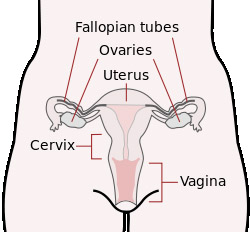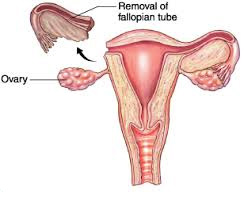There has been evidence for some time that having had a tubal ligation (tubes tied) can decrease your risk of ovarian cancer. The reasoning behind this is that the pathway from the vagina to the ovaries is interrupted and therefore possible cancer causing agents can no longer reach the ovaries. In addition to this evidence, new research shows that actually removing the fallopian tubes may decrease your ovarian cancer risk by another mechanism. It may be that some ovarian cancers begin in the fallopian tubes.
These factors can increase your risk of getting ovarian cancer:
- Age – The older you are, the higher the risk.
- Family history – If someone in your family has had ovarian, breast or colorectal cancer the higher the risk.
- Obesity – If you are overweight studies suggest you are at a higher risk for ovarian cancer.
These factors can decrease your risk of getting ovarian cancer:
- Reproductive History – Women who have had children have a lower risk than those who have not had a child.
- Birth Control – Women who have used birth control pills have a lower risk (up to 50%) of ovarian cancer.
These factors play a part in determining your overall risk for some types of ovarian cancer. This is important because, while it is not the most common form of gynecological cancer in women, ovarian cancer is the most deadly. Unfortunately, screening and early detection has limited value because in the majority of cases, the cancer is discovered only after it has spread to other parts of the body. It is important to note, up to 85% of women that develop ovarian cancer have no family history and no risk factors.
There is another factor that can reduce your chances of getting ovarian cancer. Having your fallopian tubes removed. Removing the fallopian tubes during hysterectomy may lower the risk of developing the most common type of ovarian cancer, researchers said in an article published in the American College of Obstetricians and Gynecologists journal.
What are Fallopian Tubes
 The fallopian tubes are structures connected to the uterus that lie open ended next to the ovary. During ovulation the egg is released from the ovary and travels down the tube into the uterus. It can be fertilized anywhere along the way.
The fallopian tubes are structures connected to the uterus that lie open ended next to the ovary. During ovulation the egg is released from the ovary and travels down the tube into the uterus. It can be fertilized anywhere along the way.
What is Ovarian Cancer?
Ovarian cancer is a cancerous growth arising from the ovary. Like most cancers, there are different types of ovarian cancer depending on where the cells begin to grow and what type of cells make up the cancer.
Symptoms of Ovarian Cancer
Unfortunately ovarian cancer does not have obvious or specific symptoms.
- Abnormal vaginal bleeding or discharge.
- Pain in the abdomen, pelvis, back or pain during sex
- Abdominal pressure, fullness, swelling, bloating or clothes fitting tighter
- Persistent upset stomach, gas, indigestion, heartburn or constipation
- Loss of appetite or feeling full quickly
- Feeling the need to urinate urgently or often
- Fatigue
Removal of Fallopian Tubes
 The fallopian tubes are removed by transecting them from their connections to the uterus and the connective tissue that supports them. This does not effect the ovaries or the hormones that they produce.
The fallopian tubes are removed by transecting them from their connections to the uterus and the connective tissue that supports them. This does not effect the ovaries or the hormones that they produce.
At Women’s Health Wise we are encouraged by this research that offers a way to protect women from the deadliest type of gynecological cancer. We recommend that our patients discuss this procedure with our physicians to explore wether it is an appropriate option for them.
